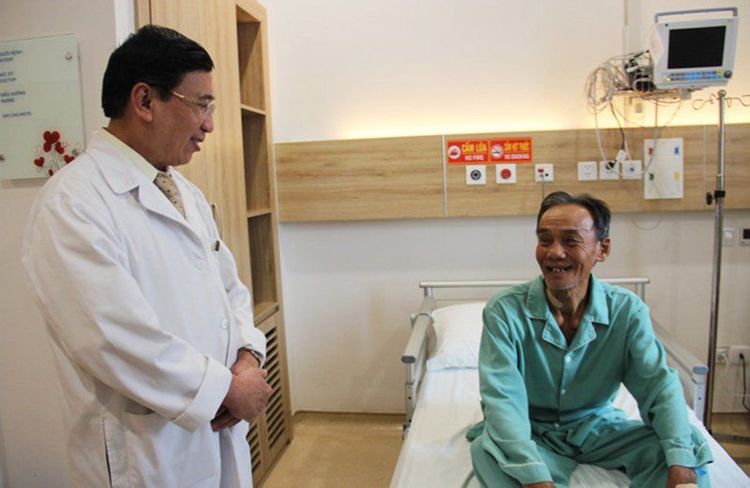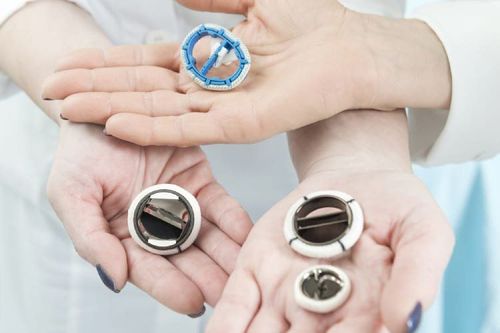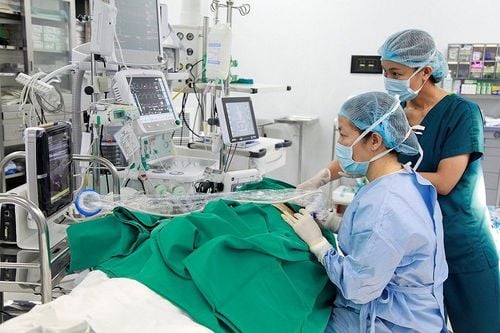This is an automatically translated article.
The article was professionally consulted by Specialist Doctor I Nguyen Xuan Tinh - Anesthesiologist - Resuscitation - General Surgery Department - Vinmec Phu Quoc International General HospitalAnesthesia for patients with percutaneous aortic valve replacement is a complex anesthetic procedure but has opened up hope for patients with aortic stenosis who have high risk factors and cannot undergo surgery as usual.
1. What is percutaneous aortic valve replacement?
Degeneration and calcification of the aortic valve are the causes of aortic valve stenosis in the elderly. Aortic valve replacement surgery is still the preferred treatment for aortic valve stenosis. However, in elderly patients, surgery often has a high morbidity and mortality rate. Percutaneous aortic valve replacement (TAVI) is an advanced technique that allows the aortic valve to be replaced without surgery. Indications for percutaneous valve replacement are mainly for elderly patients who are weak, have many chronic comorbidities, and cannot be operated on. This method is simple, less invasive, has a high success rate, is as effective as open surgery and has a lower risk of complications. Percutaneous aortic valve replacement also helps to shorten the postoperative time and hospital stay compared to traditional open surgical methods. When performing TAVI, the doctor will use a device with a valve that is threaded through the skin, into the femoral artery and raised to attach to the aortic valve.

Bệnh nhân thay van động mạch chủ qua da tại Bệnh viện ĐKQT Vinmec
Patient (>= 60 years old) severe aortic stenosis (valvular area < 1 cm2; degree of severity). mean transvalvular gradient > 40 mmHg), symptomatic, and prognosis > 1 year survival. There are aortic and peripheral artery anatomy suitable for the method. Have a desire to perform TAVI. Approved by the “cardiology team” (including internal cardiologists, cardiologists, interventional cardiologists, anesthesiologists) approved. The TAVI technique is contraindicated in the following cases:
Patients can tolerate valve replacement surgery with low surgical risk. Arterial access does not meet the requirements (femoral, subclavian, etc.) narrow/obstructed, calcified, small (then consider apical replacement technique and must be combined with minimal surgery) . Patients with contraindications to percutaneous aortic valve replacement can choose the appropriate treatment according to the doctor's prescription to bring the best results.
2. Anesthesia for patients with percutaneous aortic valve replacement
Anesthesia is an anesthetic method often chosen in surgery, anesthesia helps the patient no longer feel pain, the patient's condition is stable during the procedure. For patients with percutaneous aortic valve replacement, the most commonly used method is endotracheal anesthesia. However, in some cases, local anesthesia can be administered, such as when the patient has severe lung disease. Endotracheal anesthesia is an anesthetic method with an endotracheal tube in place to control breathing during anesthesia and surgery. Equipment for endotracheal anesthesia used includes anesthetic agents, endotracheal tubes, ventilators. During the procedure, the patient will temporarily lose sensation and consciousness due to the effects of anesthesia, but the patient can still breathe on his own or breathe through an endotracheal machine.

Gây mê nội khí quản cho bệnh nhân trước khi làm thủ thuật
Percutaneous aortic valve replacement is a difficult procedure requiring high technical expertise. In addition, this procedure must also be performed at reputable medical facilities with modern equipment to ensure patient safety during surgical anesthesia.
Vinmec International General Hospital is currently the only place in Vietnam that is equipped with a Hybrid room and advanced equipment such as DSA angiography machine, anesthesia machine with integrated hemodynamic monitoring software. In a strict manner, difficult and complex surgical methods can be performed, modern equipment brings the best image quality to the surgeon.
In particular, Vinmec International General Hospital is also the only address awarded the certificate of "independent aortic valve replacement" in Vietnam, and Prof. Dr. Vo Thanh Nhan is a cardiologist. First card awarded "Proctor" certificate in Vietnam. In addition, the hospital also has a "cardiology team" that works in unison, and at the same time supports the Cardiovascular surgeons to bring the best treatment results to patients.
In April & May 2021, when there is a need for cardiovascular examination and treatment at Vinmec Times City International Hospital and Vinmec Central Park, customers will enjoy double incentives:
- Free examination Specialty
50% discount for customers with post-examination treatment indications. The program is limited to the corresponding technique of each hospital and to customers who perform this treatment technique for the first time at Vinmec.














